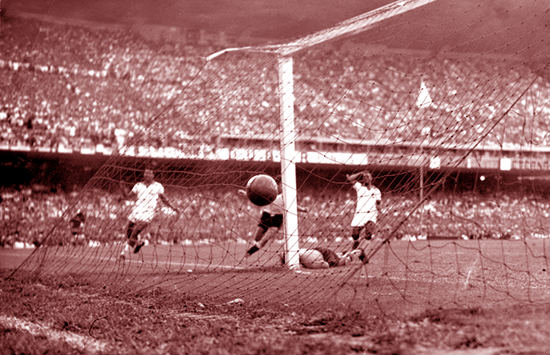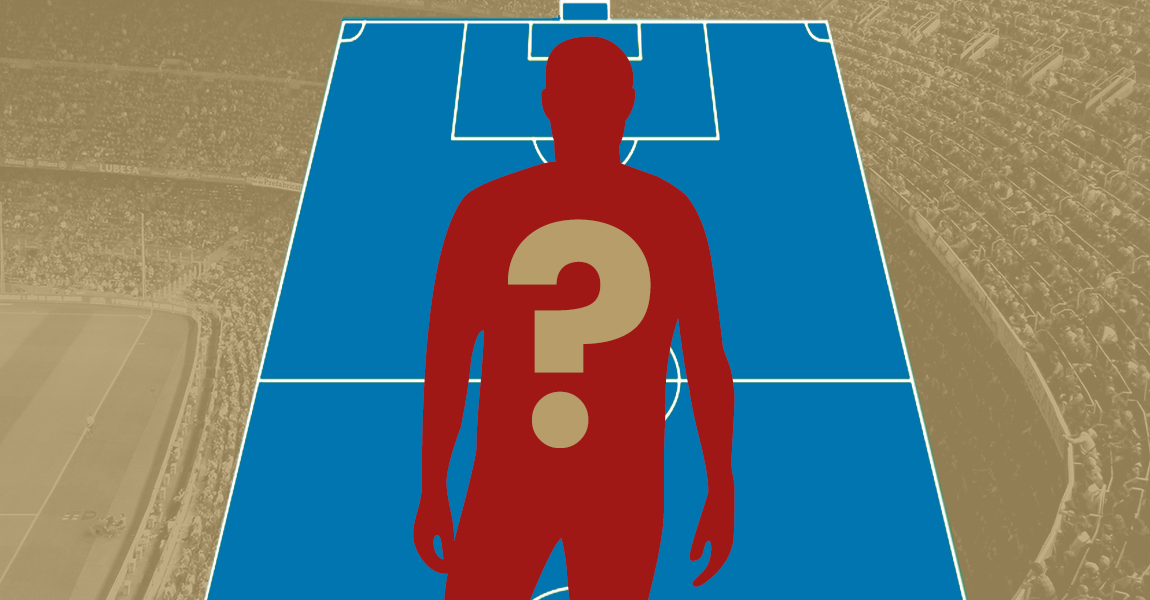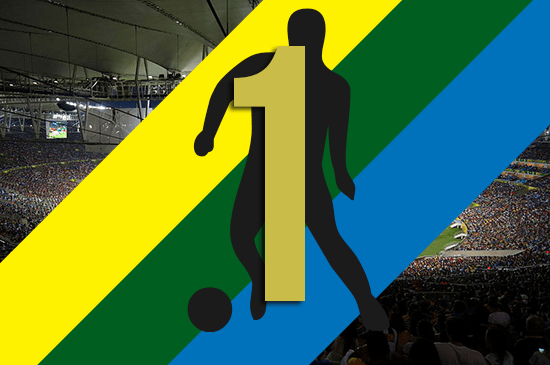Garra Charrua is a Uruguayan term for displays of bravery in the face of overwhelming odds. That’s exactly what happened at Maracanã on 16th July 1950. Uruguay defeated home team Brazil 2-1 to surprisingly emerge winners in a match that still haunts the natives of the nation. The term Maracanãzo, which roughly translated means ‘the Maracanã blow’ became synonymous with the match.

“Only three people have ever silenced 200,000 people at the Maracanã with a single gesture: Frank Sinatra, Pope John Paul II and me”. These words were spoken by Alcides Ghiggia, the Uruguayan who set up the equalizer and scored the winning goal for the visitors. The man who came to be known as the ‘tormentor’ of Brazil is ironically the only surviving member of La Celeste‘s 1950 World Cup winning squad.
The road to the title in the 1950 World Cup was a little different. After the preliminary group stage, the format continued and it was yet another group stage comprising four nations, the leaders of which would be crowned the World Champions.
The Uruguayans reached the final by barely scraping through. They got lucky in the first round, in which the withdrawals of Scotland and Turkey meant they only had Bolivia to beat to reach the final group pool. In the final group stage, they drew against Spain and won against Sweden. However, it cannot be stated that they had reached the penultimate stage of the tournament by sheer luck. Uruguay was also a formidable side in football. They won the Olympic Games gold medals in 1924 and 1928 and were also the winners of the inaugural World Cup in 1930. But compared to Brazil, they were the lesser favorites.
On home soil A Seleção had been running riot through the World Cup. A 4-0 win against Mexico, followed by an impressive 6-1 win over Spain and 7-1 over Sweden meant that everyone believed that Brazil were going to be Champions. They had not only won their previous two matches with ease, their star striker Ademir had already scored eight goals in the tournament, a record he would hold till compatriot Ronaldo equalled it in 2002. Add to that the fact that opposing teams had found it extremely difficult to score against the Brazilian goalkeeper Moacir Barbosa. But the biggest reason they were viewed as the nation who would definitely win the tournament was simply because they were expected to win the whole thing on their own pitch, in front of the 200,000 Brazilian eyes. The Maracanã stadium was constructed for the final and was made big enough so that enough Brazilians could see their players lift the trophy.
Before the match, everything was done in preparation for Brazil to be crowned champions. Jules Rimet had prepared a speech in Portuguese, newspapers had the headlines already printed and people had taken the next day off from their jobs to revel in the expected glory of their nation. The Brazilian newspaper O Mundo printed an early edition on the day of the final containing a photograph of Brazil with the caption “These are the world champions”. Obdulio Varela, the Uruguayan captain, was enraged when he saw this in his hotel on the morning of the final match. He was so furious that he bought every copy they had and took them back to his room. He then laid the newspapers on the bathroom floor, called his teammates and asked them to urinate on them.
The match took place on July 16th 1950. Given the round-robin format, a draw would be enough to crown Brazil the World Champions but Uruguay needed a win. After a lot of attacks and counter-attacks, the score remained goalless in the first half. In the 47th minute, Friaça, the Brazilian striker gave the hosts the lead. 200,000 fans erupted in jubilation and saw destiny doing what it was expected to. 20 minutes later, the party was halted as Juan Shiffano put the ball in the top corner of the Brazilian net after being squared by Ghiggia and gave La Celeste hopes of returning home with a trophy. But the Maracanã didn’t panic just as yet. A draw was still good enough, all they needed to do was for their players to hang on to the score, defend properly, put bodies on the line. But they were unable to hang onto that score and Ghiggia scored in the 80th minute. Now they panicked.
Barbosa was getting ready for another cross from the Uruguayan and shaped himself accordingly. But the cross never came. Ghiggia instead drilled a low ball to the near post. Many argue that the Brazilian who was regarded as one of the finest shot-stoppers of the time, should have saved that goal. But the nerve of the moment, the expectation of an entire nation only added to the pressure and Barbosa lived till his death haunted by that goal and ‘Maracanazo’. He said in in Teixeira Helder’s book, “I thought of killing myself – that was the best (option) for me. Then, I told myself that even dead, the people would still have continued to hate me.” Barbosa indeed lived his remaining life in shame and despair. “Under Brazilian law the maximum sentence is 30 years,” he said, in a quote that is often repeated. “But my imprisonment has been for 50 years.” In 1994, he went to watch the Brazilian team train and offer them some advice. But coach Mario Zagallo did not allow it. He believed that Barbosa was bad luck.
The Brazilians continued to attack Uruguay and hoped that they could somehow get a goal back and salvage a draw. 10 minutes later, the loss was going to become a reality. Clutching to hope is the most painful thing because after that comes the misery of awakening. Every Brazilian in the stadium spent the last 10 minutes of the match with the hope that the supreme power or fate would intervene and do the right thing and help one of their players to score a goal. They demanded it. But destiny laughed at them in their face, as put by the Brazilian coach Flavio Costa later.
Brazil had lost the final. The Maracanã was silenced, and 200,000 fans were overcome with disbelief. Brazil was shockingly humbled on its own soil. A Brazilian committed suicide, and three others died from heart attacks. There was no award ceremony for Uruguay as FIFA had not prepared for a Uruguayan victory. Schiaffino, the scorer of the equalizer certainly didn’t mind it.
He recalled, “I was crying more than the Brazilians. It made me very sad to see them suffering like that. When we were waiting to receive the cup out on the pitch I felt like running off to the dressing rooms. We all felt very emotional.”
This was not a loss of silverware or of the chance of being crowned ‘champions’. It was a loss of self-esteem and pride. Brazil were so depressed and dejected at losing that final that they began to question a lot of things, but most importantly their status as a nation of the future. A backward Latin American country had one sphere of culture and life it could proudly boast about. And it was taken away by comparatively, an even more backward Latin American country. Football was Brazil’s biggest expression of talent and creativity. The nation took immense pleasure and pride at their talent in the sport and regarded it as a thing which made them superior than the Western countries. The loss was unbearable. It is regarded as a national tragedy and was likened to the bombings of Hiroshima and Nagasaki then and the 9/11 now.
Brazil, the hosts of the upcoming World Cup have a lot of expectations in the upcoming tournament and are one of the favorites for it. They would be wearing the yellow kit with the green neck-lines. Why is that significant, you ask? Till 1950, Brazil’s kit was white with a blue neckline. This was changed to the present kit because of the apparent ‘jinx’ of the 1950 kit.
But why winning the tournament is so important for the host nation is because they would finally be able to put the ghost of Maracanã to rest. They would, however, have an incredible challenge to overcome: they will only play on the ground in the final of the tournament. A sixth World Cup title won where the very first was lost could tone down a lot of agony and having won the 2013 Confederations Cup at the ground, Luiz Felipe Scolari’s side would have confidence of winning the tournament if they reach the final, and not letting the Maracanazo play games with their minds. But if they lose at their Mecca, again, there may be no helping the hosts and the ghost of Maracanã would torment succeeding generations to come.
























































